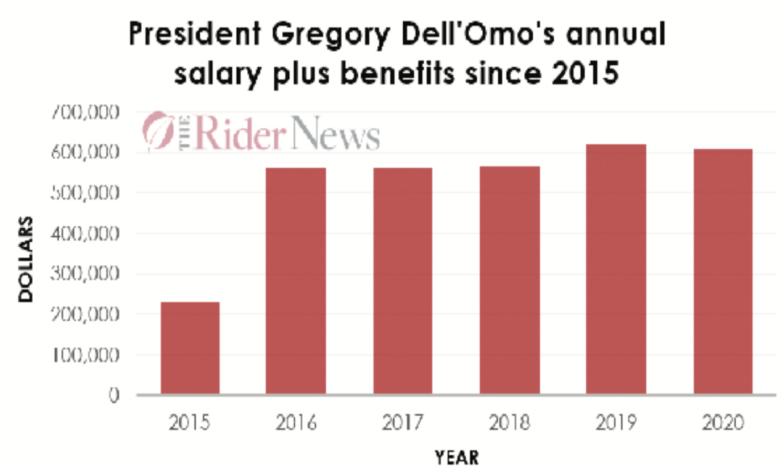
Tax forms show drop in pay for number of top Rider employees
By Shaun Chornobroff
As Rider felt the effects of the COVID-19 pandemic and attempted to put itself on a financially responsible path, the most recent IRS records show that a number of university cabinet members, including Rider President Gregory Dell’Omo, took reduced salaries during the pandemic’s height.
The Rider News acquired a copy of the university’s 2020 IRS 990, which tracks the university’s spending in the fiscal year that spans from July 1, 2020 to June 30, 2021.
After Rider distributed more than $200,000 in administration bonuses and incentive compensation in the 2019 fiscal year, the university did not list a single dollar spent in bonus and incentive compensation in its most recent tax forms, filed on May 16.
“Senior administrators, including the president, took a pay cut in 2020-2021. Cabinet took a 20%
pay cut during the summer months and 10% for the remainder of the year. … These steps were explicitly taken to help mitigate the university’s financial challenges,” Associate Vice President for University Marketing and Communications Kristine Brown said.
Although he received a more than an $18,000 increase in his base salary, Dell’Omo saw his total compensation decline from the previous year.
Dell’Omo, the university’s highest-paid employee, earned $532,400 between his base salary and other reportable compensation and $620,112, when including nontaxable benefits in the 2019 fiscal year.
In the 2020 fiscal year Dell’Omo was listed as making $514,685 in salary and reportable compensation — a 3.3% drop from the previous year — and $605,516 between compensation and nontaxable benefits in the report.
Of the $64,656 Dell’Omo receives in nontaxable benefits, 46% of that is attributed to his residence adjacent to campus, which the university provides and requires him to take, according to the tax forms.
Even though Dell’Omo took a pay cut in the 2020 fiscal year, the university president consistently received increases in his compensation in prior years. Arthur Taylor, a former president of Rider’s chapter of the American Association of University Professors (AAUP), said he was not overwhelmed by the president’s willingness to take a pay cut.
“That’s good, that’s a start, but it doesn’t match faculty sacrifices or sacrifices of other members of administration who aren’t in that top echelon of vice presidents,” Taylor said.
A number of other members in the president’s cabinet saw their reportable income decrease without bonuses from the year prior. Rider’s Vice President of Finance, Treasurer and Chief
Financial Officer James Hartman saw more than a 17% decline in reportable compensation after a decrease in his base salary and bonus or incentive compensation in the 2020 fiscal year, and after receiving $41,533 in bonus and incentive compensation in the previous year, according to university tax forms.
In addition to Hartman, who experienced the largest drop in compensation among cabinet members listed on the report, four other members of the president’s cabinet experienced at least a 15% decrease in their reportable compensation from the year before. Mark Solomon, the university’s general counsel, had his reportable income decreased by 10.6%.
The university’s second-highest paid employee Kevin Baggett, who made $339,050 in base compensation, and when accounting for all forms of compensation and nontaxable benefits, accrued a total of $376,554 in the 2020 fiscal year.
This was a slight decrease from the previous fiscal year for the veteran coach, who made $380,578 the previous fiscal year, tax forms show.
This past season, Baggett coached the Broncs to a record of 14-19, but led Rider to its best performance in the Metro Atlantic Athletic Conference (MAAC) Tournament, making it to the semifinals, which included an upset victory over top-seeded Iona.
Two professors, marketing professor Cynthia Newman and psychology professor Gary Brosvic, were among the university’s 10 highest-paid employees, but Hartman explained that the professors, along with Baggett, are members of the AAUP; therefore, their payment is handled differently in comparison to cabinet members and other employees.
The 990 form shows the biggest expenditure Rider faced in the 2020 fiscal year was a $1,466,544 payment to Ellucian, an information technology company that runs DegreeWorks and specializes in work with college campuses. In addition, the university paid 160over90, a national marketing agency with a location in Philadelphia, more than $1.1 million.
Brown explained that while the number paid to 160over90 may be large, the company also acquires advertising for the university.
Rider also paid $484,500 for a pipe organ repair, and in the heat of the COVID-19 pandemic, the forms indicate that the university paid Resource Management Group $414,498 for “COVID-19 related services.”
“That was one of the many challenges of COVID,” Brown said. “In addition to keeping people healthy and safe, it required an immense amount of sources financially for a whole host of different reasons. The pandemic resulted in a lot of expenses for the university that weren’t obviously planned for since the pandemic is not usually planned for.”


